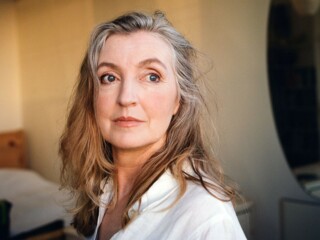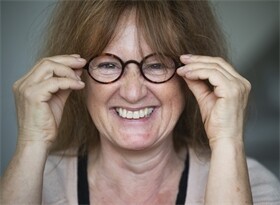‘My Imagination Takes Me There’: Marieke Lucas Rijneveld and Michele Hutchison interviewed by Sophie Collins
Posted by Sophie Collins

Marieke Lucas Rijneveld is an author and dairy farmer. Following the success of their debut poetry collection, Calf’s Caul, which won Holland’s prestigious C. Buddingh’ Prize in 2015, The Discomfort of Evening, Rijneveld’s first novel, was recently shortlisted for the International Booker Prize.
The novel follows Jas, a girl on the near edge of puberty, as she makes a strange bargain with God: worried that her father is feeding up her pet rabbit for Christmas dinner, Jas impels God to take her brother, Matthies, instead. Shortly, Matthies dies in a freak accident, and Jas’s sense of agency is simultaneously skewed.
Living on a farm in the Dutch countryside, in a family who subscribe to the harsh teachings of the Reformed Church, much of the book is about the effect of grief as it chafes against Jas’s inexorable process of self-discovery (physical, psychological). But – and without wanting to give too much away – Jas’s coming-of-age story is atypical, treading an often indistinct line between life’s hard realities and the inventions of a young and furtive imagination. The book’s ending is shocking, unexpected.
With our planned launch event at the London Review Bookshop in March unfortunately cancelled due to the spread of Covid-19, I put some questions to Marieke Lucas, and to Michele Hutchison, the novel’s translator, via email. Marieke Lucas’s reluctance to re-enter the book via a critical discussion of its themes was palpable, and so Michele, an experienced literary translator and editor based in Amsterdam, handled many of the questions that pertained to my interpretation of The Discomfort of Evening. Indeed, Michele passed on that, in addition to their dealing with the fallout of the pandemic and being taken up with new writing work, Marieke Lucas’s thinking about the world of the book tended to be in terms of pure fiction, through authorial instinct rather than literary tropes and symbols.
Sophie Collins: Abjection pervades the book. Jas undergoes a multitude of unpleasant and degrading experiences, and of course the Mulders children are encouraged – in quite a literal sense – to embody abjection by renouncing pride in the name of God. Some of the more wretched scenes in the book relate to Jas’s and her siblings’ sexual development. What do you see as being the role of the abject, of psychological horror, in your novel?
Marieke Lucas Rijneveld: If someone dies in a family it either brings them together or tears them apart. Jas’s family grows apart and the farm becomes filled with grief and each character’s way of dealing with it. Children tend to experiment during puberty and this stage of development coincides with the events in the book. I wanted to see how far they would go and let my imagination take me there.
Michele Hutchison: The novel is about a family descending into the darkness of grief and spiralling out of control as their various coping methods actually further their decline. In terms of your question about the abject – as a reader you follow Jas’s search for her identity, but of course this is going to be skewed both by grief and by the way religion (‘a cruel, unforgiving God’ as Marieke Lucas has described him) affects the family’s psychology. Abjection is linked to self-determination in a twisted kind of a way.
SC: Jas repeatedly refers to the Jews living in the basement of the Mulders’ farmhouse, though there’s never any real evidence for this – they become more of a figment through which Jas can explain some of her mother’s depressive behaviour. Jas also draws lines of comparison between herself and Adolf Hitler, beginning with the fact that they share the same birthday. What is the relevance of fascism to The Discomfort of Evening?
MH: Jas has learned about Hitler at school, and she comes from a farming community. Many Jewish people went into hiding on Dutch farms so in her typical imaginative logic, Jas connects the disappearance of food into the basement with this possibility. I don’t think Marieke Lucas intended fascism to be particularly relevant to the story, though of course there’s perhaps an unconscious parallel in terms of the tyranny of God or the father figure. Grief too is omnipotent but must be hidden away. I believe much of the symbolism in the book occurred during the creative act of writing which often opens up a role for the writer’s subconscious.
SC: The book begins with a wager that goes awry, and I was struck by the sheer amount of bargaining that takes place in the book – between the family members and within Jas’s interiority. Is this way of conceiving of the world related to the Mulders’ religion and to the concept of sacrifice?
MH: Jas makes a childish wager – for God to take her brother instead of her pet rabbit – but I see this as an act of her imagination and separate from her experience of religion. That said, the Bible has a huge influence on the children in the book – remember they are repeatedly advised to read it – so it’s natural that an Old Testament way of thinking should be subliminally adopted and sacrifices should be made as an attempt at atonement.
SC: In contrast with the global presence of Dutch figures in the visual arts, not much is known about the literary culture of the Netherlands in the UK – even the more popular Dutch authors (Harry Mulisch, Jan Wolkers, Gerard Reve) would, I am sure, elicit a shrug from most English-language readers. Which Dutch authors – living, dead – do you feel have influenced your reading and writing habits?
ML: I have been hugely influenced by Jan Wolkers; he is one of my favourite Dutch writers and is very important to me. I was inspired to write after reading one of his novels, Terug naar Oegstgeest (1965), which is about his own childhood. I was gripped by the imagery he uses, his love of nature, his Reformed church background, and the sexuality in his books. This was the first of his books I read. I was nineteen at the time.
SC: The prose style of The Discomfort of Evening is, to my mind, remarkably patient, evenly paced. It is also highly intricate, visceral, dealing with the grizzly minutiae of life on a cattle farm. Did your background in poetry prepare you in any way for the writing of the novel?
ML: The book started more like a kind of prose poem that went through various drafts. There is also an overlap in themes between this and my first poetry collection Calf’s Caul. They cover the experience of childhood grief. With prose you have to have more eye for the reader – I learned that while writing my debut – whereas with poetry you have a bit more freedom.
SC: What are you working on now? Poetry? More fiction? Non-fiction?
ML: At the moment I’m completely focused on my new novel. Or rather, my two new novels. Last week I started writing a new story. It felt very urgent, even though I’ve been working on another book for the past year and a half. Now I don’t know which one is going to come out first, but that doesn’t matter. The most important thing is that I’m writing and that it is fulfilling. Particularly now in times of corona. It is something to hold on to, doing this every day provides structure. It also gives me a kind of reason for existing.
In any case, first a new novel will come out and then another poetry collection. From time to time I write a poem, but it’s better for me to concentrate on my second novel now. The poetry will come again later.
SC: How exciting. Are you able to tell us anything – even very brief! – about the new novel at this stage?
ML: Unfortunately I can’t tell you anything about my new novel. Right now I’m deep in the writing process and it needs to exist only inside my head for the time being. But it’s wonderful to be working on something new, to lose myself in a new world.
SC: Michele, is this your first time translating Marieke’s work? I know it’s their first full book to be brought into English, though several poems from their first two collections have already been translated by another translator, Sarah Timmer Harvey. How was it finding your way into the voice of Marieke’s novel and conveying it in the English? The register throughout is so lyrical, the prose so rooted in image – it’s clear for me to see, now, how it began life as a prose poem …
MH: Yes, it’s my first translation of Marieke Lucas’s work, although this week I’ve been translating one of their poems for the first time. My background as a translator of both poetry and prose certainly helped me with translating The Discomfort of Evening. There’s a poet’s eye at work throughout the novel and it is the striking poetic images and metaphors that make the writing so unique.
SC: I’m interested in Gayatri Chakravorty Spivak’s notion of translation as ‘the most intimate act of reading’. As a translator, does this description of the process of translating resonate with you?
MH: A translator steps into a writer’s shoes so it is a very intimate act. Perhaps there is even something unheimlich about the way you try to channel the author, mirroring their style as best you can and taking over their voice. There’s also another level and that’s the characters in a story – obviously you need to get under their skin too. I felt a certain affinity with Jas so perhaps there’s something of me in the English version of her.
SC: How do you feel about the increased visibility the Man Booker International is affording translators? It feels like a really interesting time for literary translation.
MH: It’s incredible. People are finally getting a glimpse into what our work involves in terms of skills and craftsmanship. Books don’t just magically translate themselves and no two translations of the same text are the same, there’s always a degree of subjective interpretation. It’s opened up an interesting conversation.
SC: What are you translating at the moment? Is there other contemporary Dutch work in English translation that you’d recommend to UK readers?
MH: Fans of Marieke Lucas’s book might like The Twin by Gerbrand Bakker, translated by David Colmer, which is also set in the Dutch countryside. A dairy farmer finds a way to deal with his problematic ageing father by shutting him away in an upstairs room. It’s a beautiful novel.
Right now I’m just over halfway through translating a brilliant novel of ideas called Grand Hotel Europa by Ilja Leonard Pfeijffer (for 4th Estate and Farrar, Straus and Giroux). It’s a state-of-the nation piece about Europe as a crumbling continent, our fetish for the historical, and mass tourism. It’s a modern-day Magic Mountain and translating it does share some similarities with mountaineering, though I also feel honoured to have been entrusted with this major work which has been a phenomenal success in the Netherlands and is being translated into many other languages at the same time.
‘The Discomfort of Evening’ is published by Faber, priced £12.99. Sophie Collins’s collection ‘Who Is Mary Sue’ is also published by Faber, priced £10.99.




